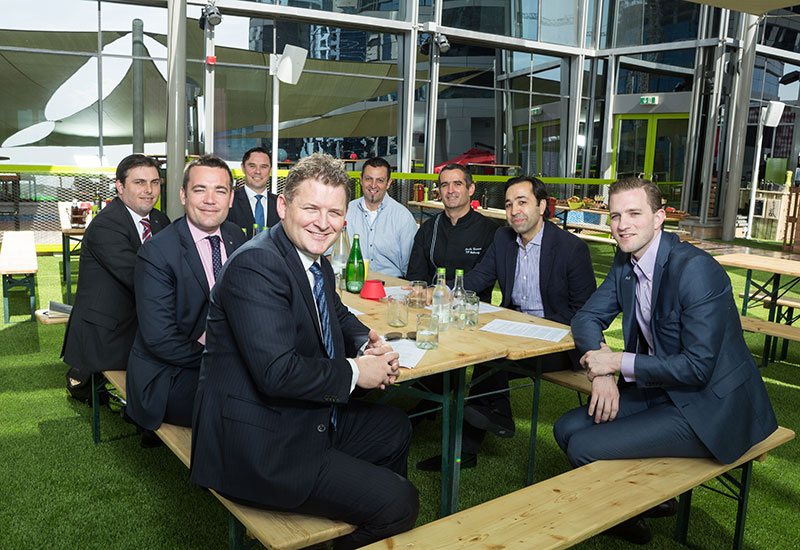In general, do entrepreneurs begin in hotels before creating their own concepts?
Marc: We are more traditional in some ways but we also create the talents that go out and try their own things, and I’ve got examples from Hilton, and I’m sure there are a lot of examples from other groups. You learn to deal with a lot of things, with marketing, ecommerce, with business development, with sales, with in-house guests and trying to attract other guests. When you’ve got all of this knowledge from working in a hotel, that’s when you go out and start creating your own concepts.
James: I think it’s your base and it is a very solid base. You’re pulling information from lots of different areas. These guys are entrepreneurial, they want to develop and grow, but the problem is they don’t come back.

| Advertisement |
Marc: They do come back, but in a different set up. They come back with their third-party brands, and we either take that franchise or we take them as a rent, so it’s win-win.
Sascha: In one way you’re all entrepreneurs but if you work in a hotel operation you’re obviously a little bit restricted because you have certain limitations. Some people are a bit more creative than others; they take their own vision and make it into a reality. Not all third-parties are successful so there’s plenty of concepts out there that are nice for two, three, four months and then afterwards their odds are down. If you look at DIFC there are some very successful brands, but then there are others that are not as successful.
Naim: All of the entrepreneurs in Dubai did come from hotels believe it or not; most of us did and a lot of us had a lot of frustrations and thought we could do it differently or better so that’s why we’ve taken a left turn and said ‘look we don’t need approvals’. Any business opportunity is about now, it’s not about six months later, particularly in a market like Dubai.
What are the key challenges of bringing third-party operators into a hotel?
Felix: We have a big nightlife component to our F&B. In nightlife, as we know, people drink and things happen, there is attention from local authorities and everyone perceives that it’s Media One but it’s not necessarily. But if you have the right operator that has experience on the local market and can deal with such challenges...
Julien: I think it is the same challenges we have for every outlet. We are following their guidelines but it is the same challenges we have for food purchase, for recruitment. There is no huge different challenge.
Marc: If the selection process is done correctly there are less challenges to an extent, specifically for rent.
Sascha: It’s the staffing and budget for both sides. One operates differently in a different location, than they do within the hotel. It’s the staffing and also the pay — if you can get someone to manage that and everyone is happy with it — but it’s challenging.
Sadettin: You have to follow brand standards. For example, maybe I work for a hotel brand and someone comes and audits the hotel and they require that you wear a name badge, but then you work with a third-party operator and the image shouldn’t be that. How do you overcome this situation? You may try to push them to follow hotel rules and regulations. Another challenge when you franchise a brand is the hotel owner pays a fee to the hotel company. If you have a franchise agreement, there’s another fee to the franchisor and the only question he asks is why he has to pay a fee twice: ‘I pay you a fee for you to create your own brands and concepts and then you’re bringing to the table a third-party where I have to pay another fee’.
Felix: It’s the price war too. They pay for a liquour licence, I add something on top for the leased outlet because I handle the alcohol. For how much do they sell the alcohol eventually? Is it going to be more expensive? Can it be cheaper (because they have to pay more for the alcohol)? It’s an important element — they don’t put a concept in that is much cheaper than my outlets, so the price element kills one of the businesses.
Naim: The biggest challenge is the gap in overall operations, positioning and equally as important I think is the challenge of finding someone that knows the local market. Someone that’s coming out of the UK today with a very successful business in Europe doesn’t mean they are going to succeed here, and we’ve seen it in prime locations, prime brands, they still manage to do not so well. So it’s about yes, sign up, but make sure they’re not coming to learn on your back. It’s about making sure you sign the right deal.
Marc: As a hotel operator, we take on a brand because we like it. Not following the standards and not keeping the integrity leads to failure. We are responsible for keeping the concept’s integrity to make sure it’s appealing and attractive for guests, so that should not be part of a standard hotel audit. Otherwise you end up turning a brand into a hotel operation, and that’s wrong. It would be very difficult to explain to an owner that they’ve had to pay a fee just to turn something into a standard hotel operation. So it’s really important that we as hotel operators, keep the brand standards of any brand we bring in.









 Search our database of more than 2,700 industry companies
Search our database of more than 2,700 industry companies









